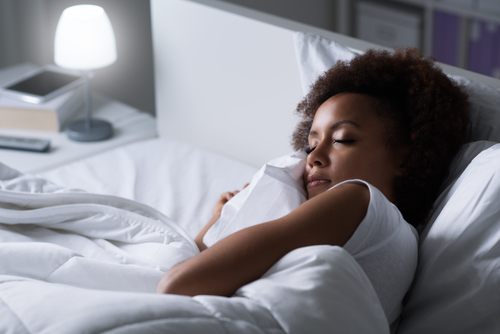Free 2-Day Shipping on Orders Over $50

Anxiety can keep anyone up at night. But when sleep itself or the process of falling asleep is the source of your anxiety, it can be even more challenging. You can't avoid the trigger for your anxiety, because that would mean not going to bed at all.

So what can you do to try and cope with worrying about going to sleep? Following are a few suggestions.
There are times of night when it is easier to fall asleep and times when it is more difficult. These "sleep windows" seem to differ from one person to another.
If you are trying to fall asleep when it is not an ideal time for your body, it will naturally be more difficult, which can feed into future worries about sleep.
But if you go to bed at a time when sleep is more likely to come without trouble, you may have fewer of these negative experiences.
Once you determine an ideal schedule for going to sleep and waking up, stick with it as closely as you can. This will help to teach your body and brain good habits and make sleep more automatic.
Your room should feature good sleep hygiene that promotes restful relaxation. This means that you should keep things like lighting and sound levels where you are comfortable with them. For most people, this entails a dark room which is quiet, possibly with white noise.
Your mattress and pillow also should be comfortable and support your spine properly. If they do not, replacing them is wise.
The National Sleep Foundation writes, “Physical activity improves sleep quality and increases sleep duration. Exercise may also bolster sleep in other ways, because it reduces stress and tires you out ... It can be especially helpful if you are able to exercise outdoors and let your body absorb natural sunlight during the daytime hours.”
Additionally, the Anxiety and Depression Association of America states, “Psychologists studying how exercise relieves anxiety and depression suggest that a 10-minute walk may be just as good as a 45-minute workout.”
Whether you are anxious about insomnia, nightmares, and/or things unrelated to sleep, those are all things which involve you and your own life experiences.
For this reason, the less fixated you are on yourself when you go to bed, the better. Look for an activity that pulls focus from yourself to something else that makes you happy and relaxed. Make that a regular part of your bedtime routine so that when you do get to bed, you are less likely to be worrying.
It should go without saying, but your bed itself is also not a place to be doing a lot of heavy thinking. Trying not to think also probably won't work though, because the harder you try, the more engaged you will be, and the more anxious you will become.
It's better just to allow thoughts to drift in and out of your consciousness without actively attaching to them if possible. Some light daydreaming may be a good alternative to thinking focused, directed thoughts about heavy issues.
WebMD writes, “Like many anxieties, dread of sleep is all about perspective. Rather than dwell on the negative effects of sleeplessness, remind yourself that it’s perfectly normal to have occasional bad nights and that occasional nighttime awakenings are to be expected.”
However old you are, you have years of experience with sleeping. If you reflect over those years, they should prove to you quite easily that you are capable of falling asleep and getting sufficient restful sleep, even if you do have those occasional difficult nights.
Our bodies evolved over the course of millennia to function properly and to get adequate sleep, even during times of stress. So when you begin to worry that falling asleep will be impossible, remind yourself that your worries won't keep you awake forever. Eventually, sleep will come. So try and replace fear with trust.
One more thing you can do to combat worries about sleep is to take something to help you get the rest you need.
You should consider avoiding sleep medications since they tend to fall into the category of anticholinergic drugs, which are associated with dementia in older patients (Unisom is an example of one such medication).
Instead, think about trying a natural supplement for sleep which includes research-backed ingredients. You can try melatonin, ashwagandha, 5-HTP, L-Theanine, or the phospholipids Phosphatidylserine. A sleep supplement which contains a combination of these natural ingredients may be able to offer the powerful support for sleep that you need.
Getting adequate sleep when you worry about falling asleep can feel like fighting an uphill battle every night.
But you have more control over the process than your anxious thoughts may allow you to acknowledge.
By improving your sleep hygiene, distracting your mind before you go to bed, getting plenty of exercise and daylight, taking a natural sleep supplement, and engaging in other healthy habits, you can overcome your fears and get the rest you need.
Enter your information below to apply 10% off to your first order. You'll love our supplements, we promise (and guarantee it)!